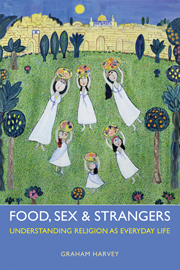Book contents
- Frontmatter
- Dedication
- Contents
- Preface
- 1 Of god and goats
- 2 Religioning elsewhere
- 3 Christianity is not a religion
- 4 Talking like a pirate
- 5 Real world
- 6 Doing violence with impunity
- 7 Respecting relations
- 8 Things full of meaning
- 9 Purity and pilgrimages
- 10 Enchantment and emplacement
- 11 Christians do religion like other people
- 12 Religion is etiquette in the real world
- Bubliography
- Index
11 - Christians do religion like other people
- Frontmatter
- Dedication
- Contents
- Preface
- 1 Of god and goats
- 2 Religioning elsewhere
- 3 Christianity is not a religion
- 4 Talking like a pirate
- 5 Real world
- 6 Doing violence with impunity
- 7 Respecting relations
- 8 Things full of meaning
- 9 Purity and pilgrimages
- 10 Enchantment and emplacement
- 11 Christians do religion like other people
- 12 Religion is etiquette in the real world
- Bubliography
- Index
Summary
This relatively brief chapter demonstrates that my earlier assertion that Christianity is not a religion was faulty. Its point, like that of this whole book, is twofold. We have mis-defined Christianity as belief, and we have approached studying Christianity wrongly by seeking to understand believing. We may have inherited the first error, but we remain responsible for continuing it by pursuing the second.
What if we (scholars of religion) had taken Judaism as the starting place for our project of understanding, analysing and debating religion and had only then researched among Christians? What if we had taken studying rather than believing texts as a core practice to examine? If lived Judaism (and not Judaism as imagined by Christians) was our definitional starting point, would we have looked for ways in which stories (rooted in and generative of texts) shape daily observances and world-structuring ceremonies as Neusner (2002: 256-60) shows them to do in Judaism? Would we have researched, written and taught more about the eating and drinking habits of Christians? To some degree we have done so, noticing, for example, that Christian denominational differences are not always about doctrines and ideas but about styles of leadership, liturgy and ritualism. Sometimes, too, we have paid attention to the diversification of Christian practice and lifestyle as it relates to cultural and geographical location.
- Type
- Chapter
- Information
- Food, Sex and StrangersUnderstanding Religion as Everyday Life, pp. 187 - 198Publisher: Acumen PublishingPrint publication year: 2013



